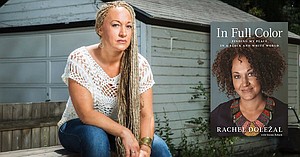3/28/2017

Nationwide — Rachel Dolezal, the former NAACP leader from Spokane, Washington who pretended to be Black although she is really white, says in her new book that her first marriage to an African American man ended because she was “too black” for him. Her new book is entitled In Full Color: Finding My Place in a Black and White World, and it discusses how she always wanted to be black – even when she was just a kid.
Her book describes the path that led her from being a child of white evangelical parents to an NAACP chapter president and respected educator and activist who identifies as Black. Along the way, she recounts the deep emotional bond she formed with her four adopted Black siblings, the sense of belonging she felt while living in Black communities in Jackson, Mississippi, and Washington, DC, and the experiences that have shaped her along the way.
She told USA Today, “I would pretend to be a dark-skinned princess in the Sahara Desert or one of the Bantu women living in the Congo… imagining I was a different person living in a different place was one of the few ways.. that I could escape the oppressive environment I was raised in.”
She also mentions in the memoir that she used to rub mud on her hands, arms, feet and legs, and as she got older, some people would assume that she was Black, and she wouldn’t correct them. She says she embraced it, and ended up tanning and braiding her hair to fit the profile of a Black woman.
Despite receiving mostly poor reviews on Amazon.com, In Full Color was able to get a few good reviews from at least two Black scholars who had the following to say:
“Finally, Rachel Dolezal in her own voice and words shares her intriguing account and path of conscious self-definition, embodied in a life of activism. . . . Rachel forces us all to question what we have come to accept until now.” — Bishop Clyde N.S. Ramalaine, author of Preach a Storm, Live a Tornado
“Rachel Dolezal’s early life memoir is not simply a narrative of radical activism. . . . It serves to critique the cultural straightjacket of traditionalist white ‘Protestant work ethic’ society. At this moment of alt-right reactionism, it punctures the fake nostalgia for an imagined pre-multiculturalism era of supposed purity and authenticity.” — Gavin Lewis, Black British writer and academic
